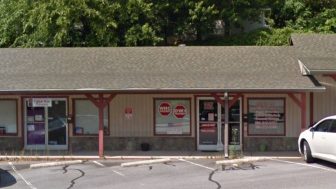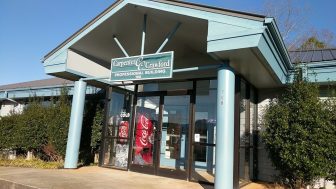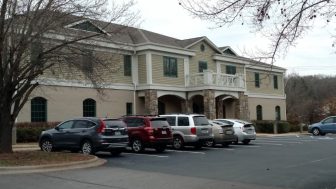Blue Ridge Health – Behavioral Health (Macon)
674 Highlands Road
Franklin, NC 28734
About Blue Ridge Health – Behavioral Health (Macon)
Blue Ridge Health Behavioral Health Macon is a Federally Qualified Health Center offering comprehensive behavioral health and substance abuse services in Franklin, North Carolina.
Their holistic treatment stands out to me. The center provides intensive outpatient care, medication assisted therapy, trauma informed counseling and special support for individuals with mental health and substance use disorders.
As part of Blue Ridge Health's nonprofit network serving Western North Carolina for over 55 years, the center delivers accessible, compassionate care that meets patients where they are and supports lasting recovery.
Welcoming Environment for Healing
The center's Substance Abuse Intensive Outpatient Program combines individual and group counseling to help patients begin recovery and develop essential maintenance skills. Medication assisted treatment options include naltrexone, Suboxone and buprenorphine to support withdrawal management and long term sobriety.
Treatment integrates cognitive behavioral therapy and trauma counseling to address both substance use and underlying mental health conditions. Sessions focus on building coping strategies, processing trauma and developing resilience with specialized dual diagnosis support for cooccurring disorders.
Patients consistently praise the staff as friendly, understanding and compassionate, creating a welcoming environment for healing.
Amenities
In order to maintain a sense of autonomy, many private rehab facilities offer clients the ability to choose their own private rooms. The privacy and personal space ensure that the recovery process is as comfortable as possible.
Addiction treatment in the metro area benefits clients by offering seamless connections from the city, around the state, and those seeking out-of-state treatment. Another benefit of attending a metro area drug rehab is that you’re close to major airports and ground transportation services.
Business centers are a preferred amenity in many mental health and addiction recovery facilities and typically feature secure, high-speed internet, computer stations, printers, and related business technologies. Business centers are designed to enable professionals and students to continue to participate in work or school activities without leaving the treatment facility.
Addiction Treatment Programs
When individuals participate in a young adult program in North Carolina, they feel more at ease in a setting that is age-appropriate. Activities, therapies, and aesthetics are all tailored for this age group, so participants can feel comfortable and are more likely to complete the program.
An adult program in North Carolina typically combines individual and group counseling, medical treatment, and various other therapies to treat substance use disorders. Treatment can take place in an inpatient or outpatient setting.
Alcohol rehab in North Carolina is a course of treatments that helps participants overcome alcohol dependency. Treatments address physical, mental, and emotional aspects of substance use disorder and help the individual develop healthy habits for long-term recovery.
Men’s rehab in North Carolina offers customized treatment for men. These programs provide personalized treatment that is designed with the unique needs of men in mind.
Women’s rehab in North Carolina allows women to receive gender-specific treatment tailored to their needs. Programs are available for alcohol, heroin, prescription drugs, benzos, and any other addictive substances, as well as co-occurring disorders.
Many therapists use cognitive behavioral therapy in North Carolina to treat substance use disorders. This goal-oriented method addresses maladaptive thinking and related beliefs that affect behaviors and can lead to addiction.
There are many types of drug rehab in North Carolina. To receive treatment for addiction, you can choose from many inpatient and outpatient programs. Often, participants start with detox and work through a full continuum of care that continues with ongoing support for long-term recovery.
Elderly rehab in North Carolina provides specialized treatment for addiction among adults ages 55 and older or 65 and older. This treatment typically addresses dual diagnosis, substance use disorder, and age-specific concerns of seniors.
Assertive Community Treatment (ACT) is an integrative, community-based care strategy designed to address the needs of persons with severe and/or complex mental illness or behavioral disorders. ACT is typically provided by a multidisciplinary team of medical and mental health care providers, social workers, therapists, and other specialists, including addiction recovery professionals. These services are frequently provided in the home and community to clients in crisis, those who are clinically unstable, and those who are unable or unwilling to travel to a hospital or clinic for in-person treatment.
Levels of Care
Outpatient rehab in North Carolina is often the next step for those who complete an inpatient program. This less restrictive treatment involves several hours of therapy per week, and accountability through 12-step meetings such as AA. You’ll continue this treatment as long as needed, which could be weeks, months, or years.
Aftercare rehab in North Carolina is a crucial part of relapse prevention. It gives you access to resources that will help you manage stress and overcome life hurdles. Typical services include career coaching, financial guidance, and ongoing counseling and emotional support. These may continue for a few months or more than a year after initial rehab.
Some of the most common co-occurring mental health disorders include anxiety, depression, and eating disorders. When these are present alongside substance use disorder, dual diagnosis treatment in North Carolina is necessary to address both conditions.
Recovery journeys often begin with intervention services in North Carolina. This treatment tool provides key support in planning and facilitating an effective intervention. Intervention specialists can also provide resources to develop treatment plans and guide families through the admission process.
Contact Information
Nearby Treatment Centers

448 Sequoyah Trail Drive Cherokee
Cherokee, NC 28719

747 S Haywood St
Waynesville, NC 28786

100 Thomas Heights Road
Suite 206
Franklin, NC 28734

44 Bonnie Ln
Sylva, NC 28779